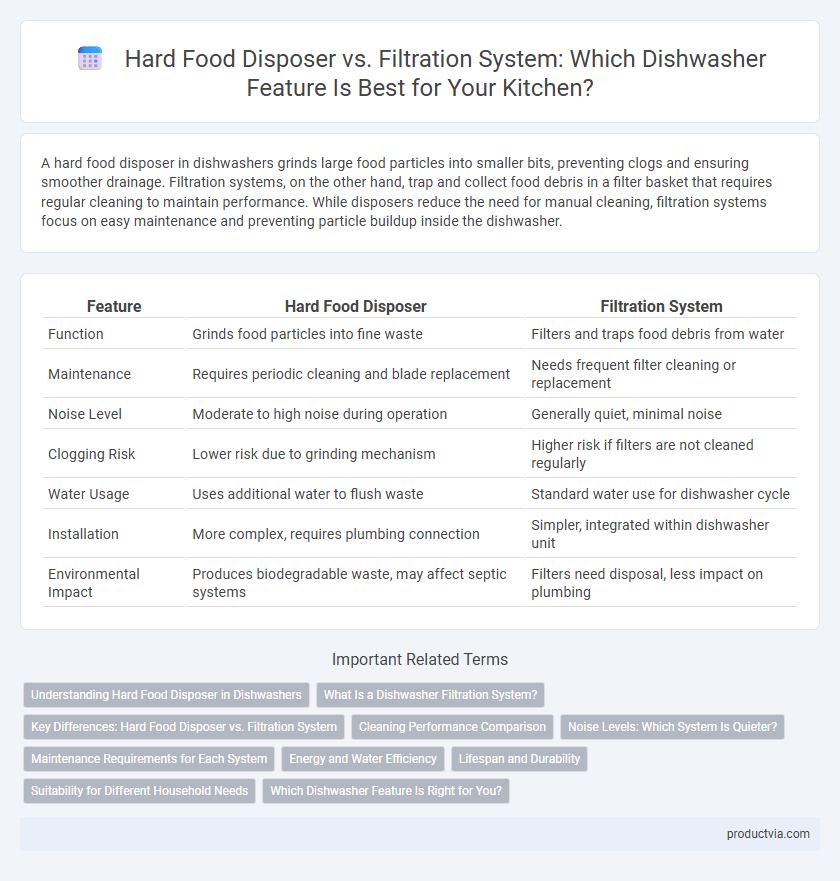A hard food disposer in dishwashers grinds large food particles into smaller bits, preventing clogs and ensuring smoother drainage. Filtration systems, on the other hand, trap and collect food debris in a filter basket that requires regular cleaning to maintain performance. While disposers reduce the need for manual cleaning, filtration systems focus on easy maintenance and preventing particle buildup inside the dishwasher.
Table of Comparison
| Feature | Hard Food Disposer | Filtration System |
|---|---|---|
| Function | Grinds food particles into fine waste | Filters and traps food debris from water |
| Maintenance | Requires periodic cleaning and blade replacement | Needs frequent filter cleaning or replacement |
| Noise Level | Moderate to high noise during operation | Generally quiet, minimal noise |
| Clogging Risk | Lower risk due to grinding mechanism | Higher risk if filters are not cleaned regularly |
| Water Usage | Uses additional water to flush waste | Standard water use for dishwasher cycle |
| Installation | More complex, requires plumbing connection | Simpler, integrated within dishwasher unit |
| Environmental Impact | Produces biodegradable waste, may affect septic systems | Filters need disposal, less impact on plumbing |
Understanding Hard Food Disposer in Dishwashers
A Hard Food Disposer in dishwashers efficiently grinds and breaks down food particles during the wash cycle to prevent clogging and maintain optimal cleaning performance. Compared to filtration systems that trap particles for manual removal, disposers reduce maintenance by pulverizing debris and flushing it away with water. This feature enhances dishwasher hygiene and performance by minimizing residue buildup and odors inside the appliance.
What Is a Dishwasher Filtration System?
A dishwasher filtration system is designed to trap food particles and debris during the wash cycle, preventing them from recirculating and clogging the dishwasher's drainage. Unlike a hard food disposer that grinds food residue into smaller pieces, filtration systems capture solid waste in a removable filter basket, enhancing cleaning efficiency and reducing maintenance needs. Regular cleaning of the filter ensures optimal performance and prolongs the dishwasher's lifespan by avoiding buildup and odors.
Key Differences: Hard Food Disposer vs. Filtration System
Hard food disposers use rotating blades to grind food particles into smaller pieces, preventing clogs and allowing dishwasher drainage to be more efficient. Filtration systems rely on a mesh filter to trap food debris, which must be regularly cleaned to maintain optimal performance. The key difference lies in maintenance: disposers reduce manual cleaning by breaking down residue, while filtration systems require more frequent user intervention to remove trapped particles.
Cleaning Performance Comparison
Hard food disposers pulverize food particles into fine residues before washing, reducing clogging and enhancing dishwasher cleaning efficiency. Filtration systems trap larger food debris to prevent recirculation, but may require frequent cleaning to maintain optimal performance. Hard food disposers generally provide superior cleaning performance by minimizing residue buildup and ensuring consistent water flow throughout the wash cycle.
Noise Levels: Which System Is Quieter?
Hard food disposer systems tend to produce higher noise levels due to their grinding mechanisms breaking down food particles, often reaching decibel levels around 50-60 dB. Filtration systems operate with less mechanical movement, resulting in quieter performance typically between 40-50 dB. For households prioritizing low noise during wash cycles, filtration systems offer a more silent solution compared to hard food disposers.
Maintenance Requirements for Each System
Hard food disposers in dishwashers require regular clearing of accumulated food debris and occasional blade sharpening to maintain optimal performance. Filtration systems demand frequent cleaning and replacement of filters to prevent clogging and ensure effective removal of food particles. Maintenance frequency for disposers is generally lower but more intensive, whereas filtration systems need consistent attention to avoid reduced washing efficiency.
Energy and Water Efficiency
Hard food disposers in dishwashers efficiently break down food particles, reducing water usage by minimizing the need for pre-rinsing and enabling shorter wash cycles. Filtration systems capture and filter debris, allowing water to be reused within the cycle, which significantly conserves both water and energy by maintaining cleaner wash water longer. Energy consumption is generally lower in dishwashers equipped with advanced filtration, as they optimize wash performance without relying heavily on water heating or extended cycles.
Lifespan and Durability
Hard food disposers in dishwashers are designed with robust stainless steel components, offering extended lifespan and enhanced durability by grinding food particles into fine waste that prevents clogging. Filtration systems rely on mesh or screen filters to trap debris, requiring frequent cleaning to maintain efficiency, which can lead to faster wear and reduced longevity. Overall, hard food disposers tend to outperform filtration systems in terms of durability and maintenance, making them a more durable choice for heavy-duty dishwasher use.
Suitability for Different Household Needs
Hard food disposers excel in heavy-duty kitchens by grinding tough food particles, making them ideal for large families or frequent cooking. Filtration systems efficiently trap food debris, ensuring quieter operation and easier maintenance, suitable for smaller households with moderate dishwashing loads. Choosing between the two depends on the household size, cooking frequency, and desired dishwasher performance.
Which Dishwasher Feature Is Right for You?
Hard food disposers in dishwashers efficiently grind and remove large food particles, preventing clogs and minimizing manual cleaning, ideal for households with heavy food residue. Filtration systems, on the other hand, trap smaller debris in a mesh or fine filter, requiring periodic cleaning but promoting quieter operation and energy efficiency. Choosing between a hard food disposer and a filtration system depends on your dishwashing habits, noise tolerance, and maintenance preferences.
Hard food disposer vs Filtration system for dishwasher features Infographic

 productvia.com
productvia.com